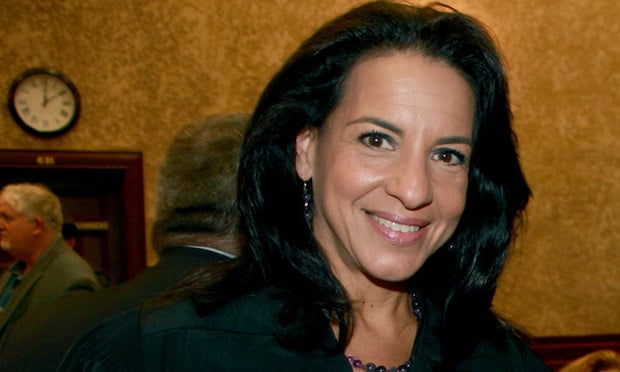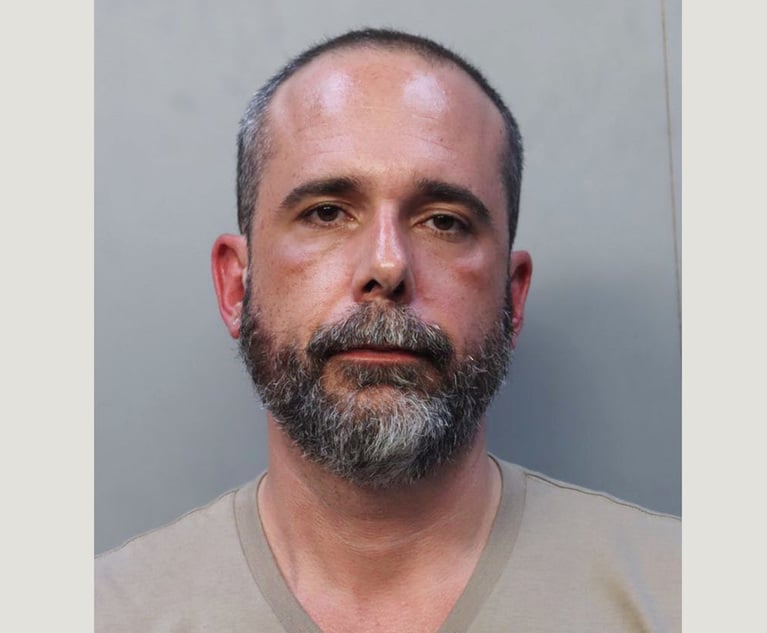Miami Judge Who Sanctioned Bilzin Sumberg is Removed From Case
"We recognize the delicate and difficult position Judge Butchko was placed in by the events as they unfolded in this case," the appellate panel wrote.
January 17, 2020 at 03:36 PM
6 minute read
 Miami-Dade Circuit Judge Beatrice Butchko/Photo by J. Albert Diaz/ALM.
Miami-Dade Circuit Judge Beatrice Butchko/Photo by J. Albert Diaz/ALM.
Miami-Dade Circuit Judge Beatrice Butchko has been disqualified from a breach-of-contract lawsuit after hitting Bilzin, Sumberg, Baena, Price & Axelrod with sanctions over alleged foul play.
The Third District Court of Appeal said it felt compelled to agree that the judge—placed in a "delicate and difficult" position—should have stepped down from the case.
Although Bilzin Sumberg withdrew from the case, the appellate court found the firm's former client's concerns about judicial impartiality were not unreasonable, since the judge had implicated him in the alleged wrongdoing.
The underlying dispute began when plaintiff Harout Samra sued former business partner Vicken Bedoyan in 2014, alleging he'd breached an oral contract, committed fraud and stole money from their business. Jurors sided with the plaintiff after a liability trial, over which Miami-Dade Circuit Judge William Thomas presided.
But things got messy at the damages phase, when allegations against attorneys on both sides emerged, and Thomas recused himself.
Butchko took over and granted a motion for sanctions against Bilzin Sumberg attorney Jose M. Ferrer. She found Ferrer and his firm allegedly used confidential information obtained via secret phone recordings without telling opposing counsel, Gunster shareholders Jonathan Kaskel and Angel Cortiñas.
Bilzin Sumberg withdrew after Butchko's 51-page sanctions order highlighted 34 bad-faith misstatements of fact and four bad-faith misstatements of law stemming from Bilzin Sumberg's representation of Samra, according to the opinion.
Samra retained new attorneys: Christopher King and Jose Ortiz of Homer Bonner Jacobs Ortiz in Miami, and Scott Cosgrove of Leon Cosgrove in Coral Gables, who moved to disqualify Butcho.
The new counsel pointed to a status conference in which the judge had said Samra had engaged in "salacious," "horrifying" and improper" actions that "derailed the case," according to the appellate opinion.
Butchko denied the request for her to step down from the case, but that was a mistake, according to the Third DCA, which found Samra's fears of impartiality were well-founded. The appellate panel stressed that although an adverse ruling isn't enough to disqualify a judge from a case, this scenario was different.
"Of significance here, this court has previously noted that 'a judge should disqualify himself or herself in a proceeding in which the judge's impartiality might reasonably be questioned, including but not limited to instances where (a) the judge has a personal bias or prejudice concerning a party or party's lawyer,'" the panel said.
The opinion further said it was important to note that Butchko had blocked Samra and his new attorneys from attending the hearing on a motion for sanctions, after an objection from the defendants, who had claimed the Samra and his counsel had "illegally intercepted" and listened to their privileged discussions.
The panel found this meant Samra couldn't defend himself against the allegations.
"Thus, Samra was effectively rendered a non-party to the very proceedings that led to the trial court's findings of facts, and imposition of sanctions," the opinion said.
Butchko has also been removed from three unrelated cases over the sanctions order, as clients at Bilzin Sumberg claimed they were worried about receiving a fair trial.
Meanwhile, Samra's new attorneys filed a pending motion against their Gunster opponents, claiming the Gunster legal team submitted a fake judgment to bolster claims that Bilzin's client has a criminal history.
Both firms have denied any wrongdoing.
'Impossible position'
Third DCA Chief Judge Kevin Emas wrote the ruling, with Judges Ivan Fernandez and Thomas Logue concurring.
The panel also acknowledged that a pending motion to strike Samra's pleadings is based on allegations similar to the ones that led to Butchko's earlier ruling, though the judge had demonstrated "a thoughtful and deliberate approach."
The panel acknowledged that although Butchko appeared to have taken a "thoughtful and deliberate approach," her ruling stemmed from allegations that overlap with those in a pending motion to strike Samra's pleadings.
Because the judge had found against Samra's attorneys and accused them of "egregious misconduct," the litigant feared impartiality going forward.
"It would also be reasonable for one to infer, from other findings contained in the sanctions order, that Judge Butchko concluded Samra was at the very least aware of the misconduct engaged in by the Bilzin firm," according to a footnote in the ruling.
"We recognize the delicate and difficult position Judge Butchko was placed in by the events as they unfolded in this case, and our decision does not address the merits of the findings, conclusions or sanctions imposed in the 51-page order," the appellate opinion read. "Nevertheless, the unique circumstances of this case, combined with Samra's allegations, which must be accepted as true, compel our conclusion that the trial judge should have granted Samra's motion for disqualification as legally sufficient."
The defense argued the issue was moot, since Butchko's three-year assignment at the complex business litigation division expired in January. Miami-Dade Circuit Judge Michael Hanzman is rotating into the division.
Plaintiffs attorney Ortiz said he was pleased with the decision.
"Judge Butchko was put in an impossible position, and it is unfortunate that Bedoyan's lawyers led her in that direction," Ortiz said. "We intend on moving forward with Mr. Samra's motion to strike Bedoyan's pleadings for fraud on the court, and we look forward to the overdue trial on damages."
Counsel to defendant Bedoyan—Matias Dorta and Gonzalo Dorta of Dorta Law in Coral Gables—did not respond to a request for comment by deadline.
Read the ruling:
More appeals:
Bilzin Sumberg Partner Sanctioned for Allegations Against Gunster Shareholders
The Exception: Florida Ruling Shows Businesses Can Be Liable for On-Premises Attacks
No Lift-Off for Lawsuit Alleging Trick Pricing on American Airlines' Website
This content has been archived. It is available through our partners, LexisNexis® and Bloomberg Law.
To view this content, please continue to their sites.
Not a Lexis Subscriber?
Subscribe Now
Not a Bloomberg Law Subscriber?
Subscribe Now
NOT FOR REPRINT
© 2025 ALM Global, LLC, All Rights Reserved. Request academic re-use from www.copyright.com. All other uses, submit a request to [email protected]. For more information visit Asset & Logo Licensing.
You Might Like
View All
Auto Dealers Ask Court to Pump the Brakes on Scout Motors’ Florida Sales
3 minute read
Saul Ewing Loses Two Partners to Fox Rothschild, Marking Four Fla. Partner Exits in Last 13 Months
3 minute read
Trending Stories
- 1Connecticut Movers: New Laterals, Expanding Teams
- 2Eliminating Judicial Exceptions: The Promise of the Patent Eligibility Restoration Act
- 3AI in Legal: Disruptive Potential and Practical Realities
- 4One Court’s Opinion on Successfully Bankruptcy Proofing a Borrower
- 5Making the Case for Workflow Automation
Who Got The Work
J. Brugh Lower of Gibbons has entered an appearance for industrial equipment supplier Devco Corporation in a pending trademark infringement lawsuit. The suit, accusing the defendant of selling knock-off Graco products, was filed Dec. 18 in New Jersey District Court by Rivkin Radler on behalf of Graco Inc. and Graco Minnesota. The case, assigned to U.S. District Judge Zahid N. Quraishi, is 3:24-cv-11294, Graco Inc. et al v. Devco Corporation.
Who Got The Work
Rebecca Maller-Stein and Kent A. Yalowitz of Arnold & Porter Kaye Scholer have entered their appearances for Hanaco Venture Capital and its executives, Lior Prosor and David Frankel, in a pending securities lawsuit. The action, filed on Dec. 24 in New York Southern District Court by Zell, Aron & Co. on behalf of Goldeneye Advisors, accuses the defendants of negligently and fraudulently managing the plaintiff's $1 million investment. The case, assigned to U.S. District Judge Vernon S. Broderick, is 1:24-cv-09918, Goldeneye Advisors, LLC v. Hanaco Venture Capital, Ltd. et al.
Who Got The Work
Attorneys from A&O Shearman has stepped in as defense counsel for Toronto-Dominion Bank and other defendants in a pending securities class action. The suit, filed Dec. 11 in New York Southern District Court by Bleichmar Fonti & Auld, accuses the defendants of concealing the bank's 'pervasive' deficiencies in regards to its compliance with the Bank Secrecy Act and the quality of its anti-money laundering controls. The case, assigned to U.S. District Judge Arun Subramanian, is 1:24-cv-09445, Gonzalez v. The Toronto-Dominion Bank et al.
Who Got The Work
Crown Castle International, a Pennsylvania company providing shared communications infrastructure, has turned to Luke D. Wolf of Gordon Rees Scully Mansukhani to fend off a pending breach-of-contract lawsuit. The court action, filed Nov. 25 in Michigan Eastern District Court by Hooper Hathaway PC on behalf of The Town Residences LLC, accuses Crown Castle of failing to transfer approximately $30,000 in utility payments from T-Mobile in breach of a roof-top lease and assignment agreement. The case, assigned to U.S. District Judge Susan K. Declercq, is 2:24-cv-13131, The Town Residences LLC v. T-Mobile US, Inc. et al.
Who Got The Work
Wilfred P. Coronato and Daniel M. Schwartz of McCarter & English have stepped in as defense counsel to Electrolux Home Products Inc. in a pending product liability lawsuit. The court action, filed Nov. 26 in New York Eastern District Court by Poulos Lopiccolo PC and Nagel Rice LLP on behalf of David Stern, alleges that the defendant's refrigerators’ drawers and shelving repeatedly break and fall apart within months after purchase. The case, assigned to U.S. District Judge Joan M. Azrack, is 2:24-cv-08204, Stern v. Electrolux Home Products, Inc.
Featured Firms
Law Offices of Gary Martin Hays & Associates, P.C.
(470) 294-1674
Law Offices of Mark E. Salomone
(857) 444-6468
Smith & Hassler
(713) 739-1250







